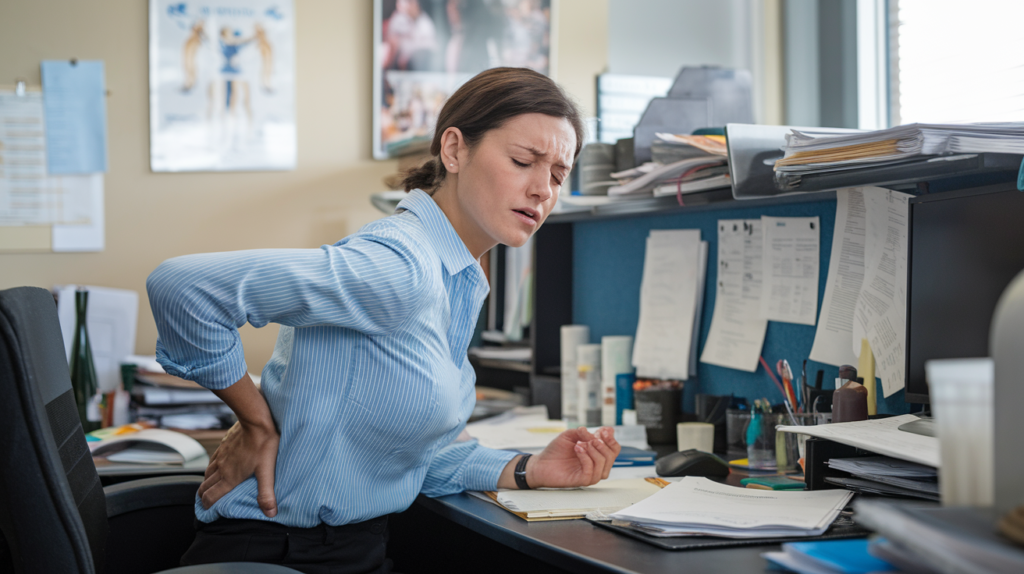Still struggling with back pain? Here’s why it’s not going away.
You wake up stiff and sore. Sitting at your desk all day only makes it worse. You’ve tried painkillers, massages, stretching—but nothing seems to fix it for good.
If you live in High Wycombe or Marlow and you’re experiencing chronic back pain, you’re not alone. Many people rely on temporary fixes that don’t address the root cause. The good news? Osteopathy offers a long-term solution—by treating the actual cause of your pain, not just the symptoms.
Here’s why your back pain isn’t going away—and what you can do to finally feel better.
1. You’re only treating the symptoms, not the cause.
Most people mask pain rather than fix it. You might take painkillers, use a hot water bottle, or even book a massage, but these only provide temporary relief.
Why this doesn’t work: Pain is often a symptom of a deeper issue—such as poor posture, weak core muscles, or movement imbalances. Unless these root causes are addressed, the pain is likely to keep returning.
Solution: A biomechanical assessment by an experienced osteopath in High Wycombe can pinpoint the cause of your pain and provide hands-on treatment, along with personalised postural advice and exercise recommendations to restore balance and mobility.
2. Poor posture is prolonging your pain.
If you have a desk job or spend long hours sitting, poor posture and inactivity could be contributing to your back pain.
Signs of posture-related back pain:
– Lower back stiffness after sitting for long periods
– Aching shoulders and neck
– Pain that worsens as the day goes on
Why this happens: Being too sedentary and not taking regular movement breaks leads to stiffness, muscle imbalances, and poor posture, all of which contribute to back pain.
Solution: Postural correction, combined with osteopathic treatment, can help reverse the damage from long hours of sitting. You’ll also receive ergonomic advice and desk-based exercises to help prevent further pain and improve long-term posture.
3. Hormonal changes are affecting your spine & joints
Pregnancy, postnatally, during menopause, and different stages of the menstrual cycle, all cause hormonal fluctuations, which may play a major role in your back pain.
How hormones impact back pain:
– Pregnancy: The relaxing hormone softens ligaments, making joints more unstable.
– Postnatal recovery: Weak core muscles and pelvic floor dysfunction contribute to postural issues and lower back pain.
– Menopause: Hormonal changes can affect bone and joint health, potentially leading to discomfort.
– Cyclical hormonal fluctuations: Hormones fluctuate throughout the menstrual cycle, leading to changes in ligament and muscle stability, which can trigger back pain, particularly during menstruation.
Solution: Specialised women’s health osteopathy can help restore core strength, pelvic alignment, and muscle function for lasting relief.
4. Stress & tension are making it worse
Did you know stress can cause back pain?
How stress impacts your body:
– Muscle Tightness: Stress causes chronic tension in your back, neck, and shoulders.
– Poor Breathing Patterns: Shallow breathing restricts oxygen flow to muscles, increasing pain.
– Fatigue: Constant pain drains your energy and makes it harder to recover.
Solution: Osteopathy combined with relaxation techniques can help release tension, improve circulation, and restore mobility—all of which support your body’s natural ability to heal.
5. You Haven’t Had the Right Treatment Plan
Many people with chronic back pain have already tried:
– Massage (temporary relief, but the pain keeps coming back)
– YouTube exercises (some work, but without expert guidance, they can make things worse)
– Painkillers (treats the symptom, not the cause)
Solution: Unlike quick fixes, osteopathy looks at your body as a whole, providing hands-on treatment and rehabilitation exercises to prevent pain from returning.
Book your appointment today
If you’re looking for a trusted Osteopath in Marlow, I offer:


Book an appointment today and take the first step toward pain-free life!


